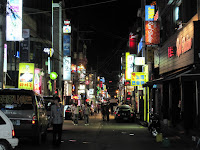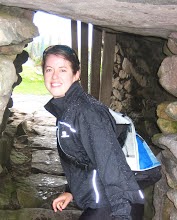For example: Right now, it is 2009 August 4th Tuesday AM 7:30
(잠월 오일 2009년 8월 4일 수요일 오전 7시 30분이에요.)
Almost a month ago, I arrived 2009 Aug 5 Sunday early early morning. My time in Chuncheon is almost over--only 2 weeks left. Not much time left for this blog post!
Living Situation
We're all housed at Kangwon National Univeristy in Chuncheon, à la dorm style. The rooms are small (half the size of a Lovett single) plus a roommate. 62 females share 8 toilets and 5 showers (compare the same numbers for only 20 males). Besides the ETAs, I'm also living with the Orientation counselors, RAs, and language teachers.
My dorm room, really small. I had to take each picture standing from a corner of the room.
I've already mentioned cafeteria food in an earlier blog. Not much has changed since then, exception that I've realized how good proper Korean food is. My cafeteria food consumption is plummeting these last two weeks since eating out is extremely cheap (1 roll kimbab 1,000won, bowl ramen 3000won, bowl patbingsu 2,000won).
Doing laundry has been an experience. Here's what has happened each time:
1. Clothes soaking wet after wash. Dryers did not work. Wrung out clothes; took 4 days for clothes to dry
2, 3. Couldn't ask for better. Clothes spun in wash (not soaking wet) and dryer worked.
4. Clothes wet after wash, but competent by now to do a spin cycle. Dryers did not work; hung up damp clothes.
After my first load, I googled Korea Laundry, and this is what I found:
My experience hasn't been that bad....yet. Supposedly most homestay moms do laundry for us....
Day to Day
Our daily schedule is quite simple: Korean class in the morning, lunch, afternoon workshop (or Camp Fulbright), TKD, dinner, free time. We're usually kept busy. Free time usually translates into lots of study time. We're learning lots of Korean fast; there's four hours of class (total 90hrs in 6 weeks!) plus all the study hours we do just to keep up. We're mainly either at the dorm, at the Millennium Building (for classes and workshops), or Back Gate (more below).
Our dorm (Dasagwahn) and the Millenium Building.
Camp Fulbright
To prepare us for the Korean classroom, Fulrbright imports 150 Korean kids to Kangwon University, under the guise of Camp Fulbright (English Camp). For the last two weeks, we've been sharing the cafeteria and the neighboring dorm with them. Every ETA observed the instructors (former ETAs) teach, then prepared and taught three lessons. It's been interesting to see the dynamic of the Korean classroom. There's little things like the boys and girls won't willing mix, thumbs up does not work, Koreans LOVE their K-pop stars (K-pop = Korean pop), etc. My lessons were mediocre; the kids didn't think they were bad, but the evaluating instructor and I knew better. As an ETA, we're Conversational English teachers. Korean students have lots of other English classes (i.e. grammar), taught by Korean teachers, that are lecture based. Our classes should be interactive and activity-based: we need to get them talking. The idea is to teach a concept or an idea (e.g. phone conversation) and let the grammar and vocab incorporate naturally, without a staightup lecture.
Kangwon University
Because we're living together and on a college campus, it's like there's a Fulbright American colony in Korea. Yes, we've been exposed to some Korean culture, but only when we leave campus to go shopping or to go out. But our bubble will break soon! Placements are announced today, and, in two weeks, we scatter across Korea to start teaching.
Our main interaction with Koreans is through KEY Club: Kangwon English Yard (an English club). All the members are college students interested (and committed!) to learning English. Most are spending the summer studying for the TOEIC (Test of English International Communication) and TOEFL (Test of English Foreign Language). We go to their KEY Club meetings to discuss selected topics. And then we go out! Most of us have language partners from KEY Club.
Going out means Back Gate (named for the back gate of the university). Back gate is filled with bars, clubs, restaurants, snack stores, and, most importantly, norabang! Nights out have generally been pretty cheap, even with lots of food, soju, and maekju. Back gate is usually has a younger university crowd, which is nice. Complete with a Dunkin' Donuts and a Baskin Robbins! This is a great place to find hilarious, broken English phrases, especially in the stationary stores. Interpretations and transformations of Western food are also interesting -->
Everything's going well and time is flying! Only two weeks left in 춘천!
Everything's going well and time is flying! Only two weeks left in 춘천!








No comments:
Post a Comment